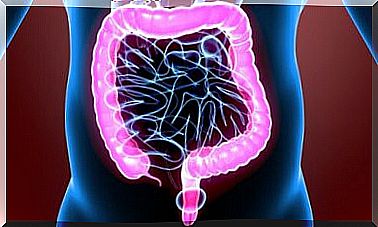Does Diet Influence The Immune System?

The immune system plays a key role in maintaining health and its functional capacity, which is largely dependent on diet. This is because our defense system needs macronutrients and micronutrients for its proper functioning. Next, find out how diet influences the immune system.
How diet influences the immune system
Numerous studies have shown a clear association between nutritional deficiencies and infectious and inflammatory processes.
In fact, there is evidence that inadequate maternal nutrition, whether due to lack or excess, can affect the child’s immunity, especially during the first years of life. The metabolic consequences last in the long term.
On the contrary, proper nutrition during childhood and adolescence implies the proper functioning of the immune system in adulthood. Therefore, we understand that carbohydrates, fats and proteins play a key role in the immune response.
Carbohydrates
Carbohydrates are important for the immune system as there is a relationship between them and insulin. This may explain the effect of carbohydrates on inflammation.
It has been observed in some studies that consumption of simple and refined carbohydrates reduces the levels of phagocytes while increasing those of inflammatory cytokines. However, fiber from complex carbohydrates, found in fruits and vegetables, appears to reduce the inflammatory state.
Protein
Both the quality and quantity of protein in the diet can modify the immune response. A protein deficiency can alter cell growth and repair and increase the risk of infection due to altered levels of antibody production.
The importance of protein in the diet is due to its ability to provide amino acids. Protein deficiencies influence immunocompetent cells, altering their responsiveness.
It was observed that diets with a low content of tryptophan and phenylalanine amino acids decrease antibody synthesis.

Fat
The important role that fats play in immune function is highlighted. Each type of fatty acid, the main component of fat, has different roles in people’s immune systems.
For example, obesogenic diets – with an excess of saturated fat – have been associated with alterations in the inflammatory response. This leads to an increase in infections, regardless of whether there is obesity or not.
On the other hand, omega 3 fatty acids decrease the most important inflammatory mediators and improve the intestinal microbiota. Similar effects have also been attributed to oleic acid.
With lesser presence of inflammation mediators, there is a decrease in the incidence of inflammatory diseases such as rheumatoid arthritis and inflammatory bowel disease.
Dietary micronutrients and their influence on the immune system
Vitamins and minerals perform multiple functions:
- metabolic pathways
- cell cycle regulation
- Modulation of cell division and differentiation processes
- Cellular integrity of tissues, epithelia and immune system.
On the other hand, the consumption of vitamins E, C, A, B6, B12, folic acid and minerals such as iron, copper, selenium and zinc, causes fewer infections due to:
- Immunomodulatory and immunostimulating effects
- Protection against free radicals
Deficits in some of these minerals or vitamins are related to deficits in lymphocytes and other important markers for the immune system.
Fortunately, many of the immune changes due to micronutrient deficits improve with supplementation. However, it is also necessary to be careful with excess micronutrients as they can have adverse effects on the immune level.

Diet for a good immune system
If you want to have a strong immune system that will adequately defend you from infections, you will need to consume:
- Fruits and vegetables rich in vitamins and minerals, as well as antioxidants.
- Pulses and whole grains to control insulin levels.
- Animal and vegetable proteins to prevent deficiency of these nutrients.
- Blue fish fats, oilseeds and extra virgin olive oil.









